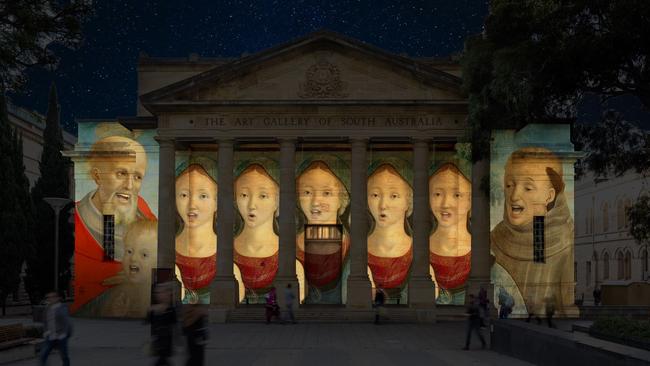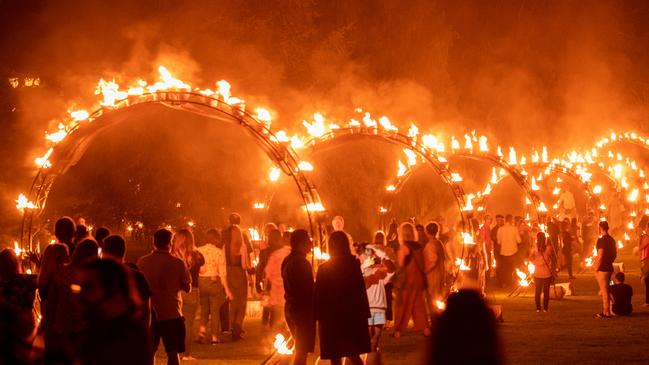How you can ‘party like its 1599’ at Adelaide’s Illuminate festival
The festival’s eclectic program this year will involve almost 150 artists who draw on everything from deepfake technology to 3D NASA photographs and the primal power of fire.

In July 2021, Adelaide was engulfed by the worst storms the city had experienced in years, just as the inaugural Illuminate festival was getting under way.
Founded by Lee Cumberlidge and Rachael Azzopardi, Illuminate was an innovative 17-day event with a program featuring dozens of large-scale art and light installations. The festival also included an impressive line-up of national and international performers poised to take to the city’s stages and music venues to explore how art and technology intersect in the 21st century.
It was hoped this midwinter cultural experiment would entice tens of thousands of hibernating South Australians off their couches and into the CBD at what was traditionally a sluggish time of year for the night-time economy.
Cumberlidge – who helped kickstart Tasmania’s Mona Foma Festival and staged the 2006 Melbourne Commonwealth Games’s cultural program – says: “For Adelaideans, winter is a time when there hasn’t traditionally been a major event. Our plan was to create an event that was really ambitious for the whole community. We wanted to focus on something that was unique about the place, which was how we landed on this idea of art and technology.’’
Azzopardi, who worked for the Sydney and Adelaide festivals and Sydney Theatre Company before developing Illuminate with Cumberlidge, concurs that the festival’s brief was “to bring the whole city alive at night-time in winter’’.
However, as their first opening night rolled around, the wild weather turned out to be so severe Cumberlidge and Azzopardi were forced to close down core elements of their program. Azzopardi recalls how, on opening night, “we actually couldn’t put on the City Lights exhibit (a CBD-wide display of light installations) and all the free outdoor installations because we had that really bad electrical storm come through’’.
The co-directors were crestfallen – yet worse was to come. Cumberlidge recounts how, “on the Sunday and Monday, when we came back to work, we got a call from the (state) government saying, ‘We’re about to announce a lockdown’ ”.
Covid was stalking the country but until that point Adelaide had been relatively unscathed by the pandemic. In a reflection of this, 35,000 tickets had been snapped up to Illuminate’s first week of shows. Recalls Cumberlidge: “The phone just started ringing as soon as it (the lockdown) was announced. People wanted to know what was happening with their tickets. It was crazy.’’
The festival board took the only decision open to it, given it could not predict how long the lockdown would last: it refunded the 35,000 tickets, including tickets for festival centrepiece Life Cycles. Devised by Canada’s internationally renowned Moment Factory, Life Cycles was a 2km nocturnal trek through Adelaide’s Botanic Gardens, which were transformed by cutting-edge video, smoke, laser and sound installations.
As the fallout from the Covid shutdown continued, Illuminate staff had to obtain from the SA Health Department a special exemption so their crews could leave isolation and secure 40 installations that were already set up in the CBD. Overseas guest artists who had been due to perform had to be put on planes immediately and flown home, or risk being stuck indefinitely in Adelaide.
Cumberlidge says with considerable understatement that refunding 35,000 tickets added up to “a lot of money. And as a start-up event, underwriting the risk of the box office ourselves, we really didn’t know what that would mean. In fact, we were facing the fact that the festival might finish before it even got off the ground”.
Given the double whammy of the storms and lockdown, Azzopardi and Cumberlidge could have been forgiven for thinking their arts and technology hybrid was jinxed: Says Cumberlidge: “That (seven-day) lockdown came out of nowhere for South Australians … Apart from the initial March 2020 temporary shutdown, we had not experienced a lockdown, and it happened just after our opening weekend.’’
Fortunately, after a disastrous inaugural week, things started to turn in the festival’s favour. The SA lockdown was lifted after seven days and Illuminate’s outdoor events were permitted to open, albeit with maximum 50 per cent attendances and “very strong” social distancing restrictions.
Ten days of the 2021 program remained and Cumberlidge says “the people (of Adelaide) really responded, so that really helped us establish the event … and businesses really, really appreciated that support. Because, of course, the CBD, like all CBDs during that period, was absolutely suffering.’’

In fact, the city embraced the festival so wholeheartedly, many remaining Illuminate shows sold out and the festival was able to trade its way out of trouble. Azzopardi says: “It became quite a South Australian good news story.”
Illuminate is now an annual fixture on Adelaide’s cultural calendar. In 2023, it attracted 1.3 million visits to its paid and unpaid events, while more than 200,000 tickets were sold to festival shows and installations. Almost 70 new commissions, involving 300 or so local and overseas artists, were unveiled.
This crowd-pleasing festival is part of a growing trend whereby state governments are funding cultural festivals – often driven by visual spectacle and interactive shows and installations – aimed at attracting locals into city centres on traditionally quiet winter nights.
In June, Sydney’s long-established Vivid light and ideas festival attracted bumper crowds to see the Harbour Bridge and its surrounds aglow and the play of moving images on the Opera House sails. In fact, the press of spectators who packed Circular Quay this month for a Vivid drone show sparked concerns about people becoming trapped – concerns the NSW government played down.
Melbourne recently wrapped up its premier festival of new music and art, Rising, which spanned 120 events ranging from community brass bands playing acid music to a Rennie Ellis photographic survey and outdoor Aboriginal art works depicting an imagined Indigenous invasion of the UK.
Festival artistic directors Gideon Obarzanek and Hannah Fox drew in a younger, hip crowd with free nightly DJ sets, psychic readings, art classes and 8/8/8: Rest, an all-night performance event that critiqued the “commodification” of relaxation.
What sets Illuminate – the fourth iteration of which opens on July 4 – apart from those winter festivals is its focus on the relationship between traditional art forms (sculpture, live music, visual art) and technology. Cumberlidge says when he and Azzopardi returned (separately) to their home town, Adelaide, several years ago, “we were both inspired by what was happening here in some of those creative industries connected to future technology. So we wanted to focus on that”.
“We had noticed from our travels internationally, the real rise in immersive forms of programming experiences. And Australia hadn’t seen much of that at that point. And so we went deep into that space, right from the outset.”
They cannily devised installations and shows big enough to cater to tens of thousands of people in well-known city venues including the Adelaide Botanic Gardens and the Adelaide Zoo. The compact size of the city’s CBD and arts precinct is an advantage, as it is with the Adelaide arts and fringe festivals. Azzopardi says: “We’re really lucky that things are quite close together, so you can really walk that canvas.” What can audiences expect this year? The festival’s eclectic program will involve almost 150 artists who draw on everything from deepfake technology to 3D NASA photographs and the primal power of fire.
Grand Mix, by French company Inook, will project famous faces from Renaissance paintings onto the facade of the South Australian Art Gallery. This ingenious spectacle will use deepfake technology to show these subjects – who will reportedly include Henry VIII – lip-synching along to Australian pop songs.

As a South Australian government website puts it, at Grand Mix, “you can party like it’s 1599”. Azzopardi says “those portraits are actually part of an exhibition called Renaissance Reimagined, inside the gallery”. It’s hoped the singing projections will encourage visitors to come back and see the art show inside the AGSA building, once the sun is up.
Cumberlidge says Grand Mix highlights differences between the role of art in the 21st century compared to the Renaissance period and subverts the art form in a fun way: “It’s very humorous,” he says. “We were pleasantly surprised how excited the gallery was to do this.”
This year, Illuminate’s City Lights program of installations and light projections will include a 6m-high inflatable pear from the UK’s Grech studio. Covered with geographical images sourced from NASA and called The World Has Gone Pear Shaped, it prompts us to ponder how people have reshaped the global environment.
Another City Lights exhibit, Glow, is an interactive music-and-light sculpture inspired by the phases of the moon. Created by Sydney studio Amigo & Amigo, it comprises 40 illuminated poles with touch sensors, which visitors can use to create their own musical scores.
Amigo & Amigo has created another interactive installation for Illuminate: Chronoharp, a gigantic, brightly lit harp that several people can play at once.
France’s Compagnie Carabosse, which created works for WOMADelaide and the Adelaide Festival’s 60th birthday, returns to the city with Fire Gardens, featuring 7000 handmade fire pots bound for the Botanic Gardens. This flaming spectacle is expected to be a festival highlight.
The 2024 program also has a strong focus on musicians who merge technology with their music. Among them is Kim Gordon, former bassist and founding member of Sonic Youth, who recently released her critically acclaimed second solo album, The Collective. Gordon is still performing abrasive and discordant rock songs – at 71.
Other artists in the music program include the UK’s Dr Max Cooper who has a science PhD and whose performances include 3D projections.
These highly anticipated shows are part of Unsound, an experimental music festival within the festival, directed by Polish-based duo Mat Schulz and Gosia Plysa.
Cumberlidge explains that “we’ve been collaborating over the last few years with Unsound” and that Schulz and Plysa “co-curate this program, which really focuses on pushing the boundaries of their form and particularly using technology in interesting ways”.
In 2023, Illuminate attracted about 15,000 interstate and overseas visitors to its ticketed events. Azzopardi argues that “events like Illuminate can be a great trigger for people to visit (other) places in the state”.
Cumberlidge says: “The first year we were unable to invite visitors because the borders were closed but it’s absolutely part of our mission to make Adelaide and South Australia a place to come in that quieter period of the year … We’re thrilled that we’re seeing that happen so soon after we established the event. It normally does take quite a few years to create that (interstate and overseas interest).”
Azzopardi, who three years ago feared it might be curtains for her fledgling festival, now says “we’re really hoping in the next five years, to grow nationally and internationally. We would like to be one of the top events in the world, really”.
Illuminate runs from July 4 until July 21 in Adelaide.







To join the conversation, please log in. Don't have an account? Register
Join the conversation, you are commenting as Logout